
In the work of the local church, a pastor will frequently come across people that are challenging to manage, much less lead. These are folks that have established unhealthy habits in relationships or have learned responses to conflict that have frequently proved destructive.
Who are these people and what can we do with them? Believe it or not, they come in several, easy-to-identify varieties and you can learn to manage them and even lead them to healthier behaviors.
And finally…the User!
Now, that’s not a very kind-sounding title, but the idea of “user” is the clearest explanation of a personality that demands a great deal of time and attention from others while bringing very little effort to the table themselves. The “User” often uses guilt to get others to act on his needs and seldom takes responsibility for himself or anything that needs to get done.
Before we discuss how to deal with these folks, a couple of realities need to be understood. They may have learned this behavior at church. Because of our willingness to help, we can sometimes step beyond what is healthy for people and create some level of unhealthy dependency. If someone always runs to pastor when they need something, before long they have built a habit. So pastors and other well-meaning church workers can inadvertently be encouraging the “User” to keep using us—believing that we’re helping when our actions may be actually be creating something else.
So what do you do with the “User”?
1. Set limits.
Establish your own boundaries for providing assistance, whether that assistance comes in the form of financial help, food provision, or ministry time. Establish a few policies about “how much we can do for someone” and let those boundaries be known to those needing assistance. For example, you can say to someone’s financial need, “I am able to help up to $100, but beyond that I will need to get approval.” If it’s ministry time, let people understand what your availability is limited to and stick to it.
Establish a few policies about “how much we can do for someone” and let those boundaries be known to those needing assistance.
2. Require responsibility.
When you assist someone with a need, help them find ways to contribute to their own need too. Give them the dignity of being a part of their solution. If they are in constant need of your time to discuss their problems, give them assignments before your next meeting, so they are working on their issues as well. If you seem willing to do all the work to meet their need, the “User” will let you.
3. Control your definition of an “emergency.”
Pastors do face emergencies. There are sudden and dire medical crises, eviction notices and threats to turn off someone’s utilities, and a few other need-to-act now moments we face in.
Learn More About Managing Difficult People in Ministry:
Want more ThoughtHub content? Join the 3000+ people who receive our newsletter.
*ThoughtHub is provided by SAGU, a private Christian university offering more than 60 Christ-centered academic programs – associates, bachelor’s and master’s and doctorate degrees in liberal arts and bible and church ministries.



